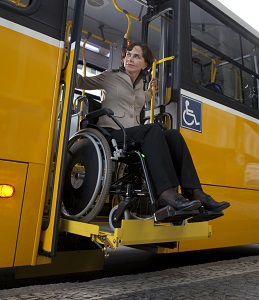Americans with Disabilities Act
 The Americans with Disabilities Act (ADA) is a federal law designed to protect the rights of disabled people in housing, employment, education, government contracts, and a host of other pursuits.
The Americans with Disabilities Act (ADA) is a federal law designed to protect the rights of disabled people in housing, employment, education, government contracts, and a host of other pursuits.
What is the ADA?
The Americans with Disabilities Act was signed into law in 1990. Because it is a federal law, its mandates apply in all states. However, states can establish additional protections above and beyond the protections of the ADA. The primary effect of the ADA is that it prohibits disability discrimination and makes disabled people members of a protected class. The ADA does not give a specific list of conditions that count as disabilities, but certain mental health conditions are covered under the ADA. Instead, to qualify for protection, a disability must interfere with a “major life activity” or a person must be widely regarded as disabled. For example, a person in a wheelchair might be protected because he or she is widely regarded as disabled, and a person with diagnosed anxiety could be protected because his or her anxiety was so significant that it interfered with his or her ability to function without assistance on a daily basis.
Rights Under the ADA
The ADA bans disability discrimination and allows people with disabilities to sue and recover both damages and attorney’s fees if their rights are violated. A person’s disability cannot be used in making decisions about whether or not to hire him or her or allow him or her to attend school, and the ADA establishes certain rights that further expand on what constitutes disability discrimination.
Examples of rights under the ADA include:
- The right to be free of employment and housing discrimination.
- The requirement that employers and educational institutions make “reasonable accommodations” to enable disabled people to work or attend school. These accommodations cannot interfere with the fundamental nature of the job or schoolwork, and might include accommodations such as allowing a student to use a note-taker or allowing a blind person to use different computer software.
- The mandate that newly-built public facilities must meet certain accessibility standards that enable people with disabilities to use the facilities
Reference:
- A guide to disability rights laws. (n.d.). U.S. Department of Justice. Retrieved from http://www.ada.gov/cguide.htm
Last Updated: 08-4-2015
- 3 comments
- Leave a Comment
loretta h
July 26th, 2016 at 7:27 AMI’m a disabled 56 yr old woman….I was trying to enter a public facility for asst with utilities… The building is owned by a private individual…I’m an amputee above knee in a wheelchair….there is no handicap parking. There is a small ramp which is usually taken by employees that work at another office..there’s two parking spot that ate marked with the handicap logo on the side off the building on the ground, but no sign on the building itself..I would have to honk…to get someone to come out…just toove a car so I come go up this ramp…I became irratied do to the fact I never could get into the building she became rude and said that ac Culley there wasn’t even a handicap ped parking spot…I call the police and say we’ll see….the officer informed me that illegally there was a handicap spot….I go to the city complain about this…the lady calls him to inform him he needs to put in a correct handicap parking spot..,that was over 5 or 6 months ago……this still hasn’t been done… Even tho the office I go to has moved…I feel that for all the years I had to fight to get into that office sometimes risking my safety some time with being embarrassed, and humiliated, and discrimated against. Then still no actions have been filed against the owner of the bank nor the city to correct it I feel I have a right to sue for discrimination and Humiliation pain and suffering
Blake
December 24th, 2020 at 11:49 PMjust Confirming counseling system choosing in touch in all honesty take care in all honesty merry Christmas happy new year
Meryl
December 4th, 2022 at 4:30 PMI’m a person with intellectual disability
Leave a Comment
By commenting you acknowledge acceptance of GoodTherapy.org's Terms and Conditions of Use.

